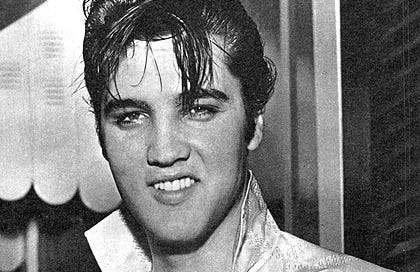Thank you for reading my weekly history blog, Talking to America. If you like this post, please take a second to hit the heart button, leave a comment or share it with a friend.
Baz Luhrmann’s lurid biopic Elvis has been nominated for eight Academy Awards in 2023, including Best Picture and Best Actor in a Leading Role. The life of the real Elvis Presley has continued to fascinate us with its remarkable mix of talent, tawdriness and tragedy.
In February 1956, Elvis’s first hit entered Billboard’s pop music top ten and Life Magazine proclaimed the 21-year-old singer the “hillbilly who howls.” Interestingly, the tune he picked for his first big record was a ballad about loneliness, despair and suicide. It was called “Heartbreak Hotel.”
A scene at a concert in Jacksonville, Florida, the previous May had given a hint of the tsunami that was about to crash into American popular music. A crowd of 14,000 teenage fans had turned out to hear Elvis. The performer had casually said, “I’ll see you all backstage, girls.” A riot ensued after the show, as thousands of adolescents mobbed their idol.
But by early 1956, Presley’s popularity had yet to spread much beyond the South. In November 1955, he had played a junior high school auditorium in Port Arthur, Texas, to an audience of 100 people. He was still featured on the Louisiana Hayride radio broadcasts, where he was initially paid $18 a show. He had recorded some classic tunes with Sam Philips’ Sun Records, but he had yet to score with a hit song.
During 1955, Colonel Tom Parker, an ex-carnival worker with a genius for promotion, began to work with Elvis and eventually became his manager. Parker arranged for RCA Records to sign his unproven Memphis crooner to a $35,000 contract.
Elvis himself shaped the music. “Heartbreak Hotel” seemed to many an odd choice as his first single release with the new label. But the tune pointed to Elvis’s eclectic sensibilities and infallible musical instincts.
Country musician Tommy Durden had read in a newspaper the previous year about a well-dressed man who had killed himself, leaving a note that said, “I walk a lonely street.” Durden imagined developing a song from the words. He talked it over with Mae Axton, a schoolteacher and publicist for Parker in north Florida. She suggested erecting Heartbreak Hotel at the end of that street. The two wrote the song in half an hour. Axton offered Elvis one-third writing credit if he would record it.
“Heartbreak Hotel” was a moody number with a jazzy intonation. The arrangement was spare, carried by a gut-bucket guitar, restrained cocktail-lounge piano riffs, and a simple strolling bass line. Elvis turned the lyrics into lush lemon lozenges that melted on his tongue.
Record executives questioned whether the song would appeal to the teenaged dance crowd that was Elvis’s primary audience. Yet somehow the melancholy lyric and plaintive melody, the alternation between wild shouting and sob-laden crooning, exactly captured the Elvis mystique. His judgment was vindicated. “I get so lonely I could die,” he sang. Teenagers ate it up.
Presley was a great fan of the cinematic pose adopted by actors like Marlon Brando and James Dean—he dreamed of becoming a movie star himself. “Heartbreak Hotel” reflected the influence of films like Rebel Without a Cause, a 1955 drama in which Dean embodied the essence of adolescent angst.
“Heartbreak Hotel” became an immediate and unprecedented hit. By March it had sailed to number one on the charts. It soon topped the lists for sales, juke box and disc jockey play in both pop and country. The 45-rpm record sold a million copies in just eight weeks. The hit turned Presley into the focus of youth hysteria reminiscent of Frank Sinatra in the 1940s and Rudy Vallee in the 1930s. No performer, though, had approached the scope of Elvis’s popularity.
Controversy helped. The bump and grind dance steps that Elvis worked into his act, along with the insinuation that dripped from his voice, was “deeply disturbing to civic leaders, clergymen, some parents,” Life noted. A Miami paper labeled his performances “obscene.” A Jacksonville judge threatened him with jail.
But the real engine of Presley’s rise was television. He was a regular on the Dorsey Brothers’ Stage Show in early 1956. On the program, he sang “Heartbreak Hotel” backed by a full jazz band. In September, when Elvis made his first appearance on the Ed Sullivan Show, he drew 82% of the television audience -- an incredible 54 million viewers. He had become a national sensation.
The impact of Elvis Presley was monumental. His muscular but sensitive baritone phrasing, along with his raucous pyrotechnics on songs like “Hound Dog,” would yield a string of hits that kept him in the top ten continuously for the next seven years. He launched the rock-and-roll juggernaut that remained the dominant form of popular music for the remainder of the century.
But in 1956, his fans cared little about his place in music history. As one 15-year-old girl declared, “When he does that on TV, I get down on the floor and scream.”
#
Listen to “Heartbreak Hotel”:





Another hit from Jack Kelly. Every one of his historical snippets have been dead on.